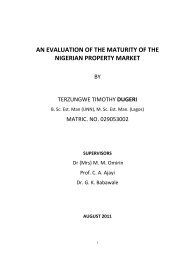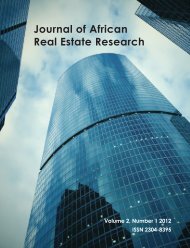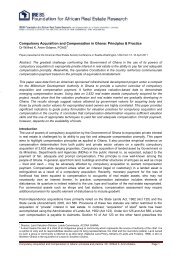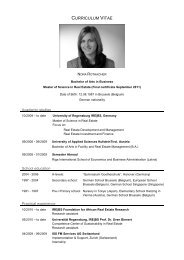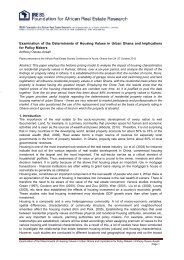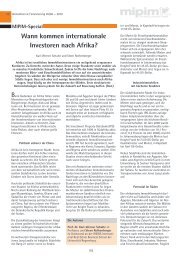You also want an ePaper? Increase the reach of your titles
YUMPU automatically turns print PDFs into web optimized ePapers that Google loves.
client” information gathering requirements under the FinancialIntelligence Centre Act which established the FinancialIntelligence Centre to help combat money-laundering.Intellectual PropertyProtection is provided by statute and common law for patents,trademarks, copyright, designs and other intellectual property.There are public registries for trademarks, designs and patentsand South <strong>Africa</strong> is a signatory to the Berne and ParisConventions and the Patent Cooperation Treaty and is a memberof the World Intellectual Property Organisation (WIPO).Tariffs and TradeExports mainly comprise gold, diamonds, platinum, othermetals and minerals, machinery and equipment and certainagricultural products. Imports mainly comprise machinery andequipment, chemicals, petroleum products, scientificinstruments and certain foodstuffs. China is currently South<strong>Africa</strong>’s largest trading partner (for both imports and exports).Other major export partners are Japan, Germany, UK, USA andthe Netherlands. Other major import partners are Germany,USA, UK, Japan and Saudi Arabia (oil).Import tariffs and direct controls such as import permits exist.There is free and virtually unimpeded exchange of goodsbetween member states of the Southern <strong>Africa</strong>n Customs Union(Botswana, Lesotho, Namibia, South <strong>Africa</strong> and Swaziland).South <strong>Africa</strong> has concluded a trade agreement with theEuropean Union (EU) for the establishment of a Free Trade Area(FTA) between South <strong>Africa</strong> and the EU. Negotiations areunderway to establish separate FTAs with the USA, theMERCOSUR countries (Argentina, Brazil, Uruguay and Paraguay),India, Nigeria and China. South <strong>Africa</strong> has benefited from theUSA’s <strong>Africa</strong>n Growth and Opportunity Act (AGOA) which allowsSouth <strong>Africa</strong>n products to enter the USA duty free. Anagreement has been concluded between the members of theSouthern <strong>Africa</strong>n Development Community (SADC) (South<strong>Africa</strong>, Angola, Democratic Republic of Congo, Lesotho, Malawi,Mauritius, Mozambique, Namibia, Seychelles, Swaziland,Tanzania, Zambia and Zimbabwe) providing for the liberalisationof trade and lowering of tariff barriers with the ultimateestablishment of a FTA. Discussions are underway betweenSADC and the Common Market for Eastern and Southern <strong>Africa</strong>n(COMESA) to lower trade barriers and establish a FTA whichwould stretch from South <strong>Africa</strong> to Egypt.Investment IncentivesThere are Government programs to support research anddevelopment, black owned and small/medium sized businesses,export market research, trade missions and other exportmarketing initiatives, feasibility studies, manufacturing projectsand certain industry specific incentives (eg in the motormanufacturing, tourism and film industries).South <strong>Africa</strong> has implemented a "headquarter company” regimeto incentivise firms to use South <strong>Africa</strong> to hold investments inother <strong>Africa</strong>n countries (or elsewhere). There are certainrelatively complicated requirements to qualify including:in each year 80% or more of the cost of the total assets ofthe company must be attributable to an interest in equityand/or a loan to a foreign company in which theheadquarter company has at least 10% of the equity andvoting rights, and/or intellectual property that is licensedto such a foreign company;in any year and if the gross income exceeds R5 million, atleast 50% of the gross income of the company mustcomprise rental, dividends, interest, royalty or a service feepayable by such foreign company, or comprise theproceeds from a disposal of an interest therein.The headquarter company will be subject to tax on its worldwideincome (like other South <strong>Africa</strong>n residents) but its shareholderswill not be subject to dividends tax on any dividend declared byit. Dividends paid by the company to its shareholders will beexempt from income tax in their hands. Similarly dividendsreceived by the headquarter company, where it holds at least10% of the equity and voting rights in the foreign company, areexempt from tax. The withholding tax on interest, which appliesfrom 1 January 2013, will also not apply to interest paid by aheadquarter company to a non-resident lender. Transfer pricingand thin capitalisation rules do not apply to loans by theheadquarter company to investees (if it holds at least 10% of theequity and voting rights in the investee) and to loans from nonresidentsthat are on-lent by the headquarter company to suchinvestees. Interest on loans from a non-resident may bededucted by the headquarter company to the extent that itearns interest from a non-resident company in which it has atleast a 10% shareholding/voting rights. Other benefits includean exemption from capital gains tax on sales of shares held by theheadquarter company, as well as shares in the headquartercompany, if the shares are sold to a non-resident and if theshares have been held for at least 18 months. It is likely thatthese requirements will no longer apply to shares held by theheadquarter company, ie they will in all cases be exempt.If a South <strong>Africa</strong>n incorporated company is used as aheadquarter company, the company may also be approved bythe exchange control authorities as a headquarter companyunder the exchange control rules (which are very similar to thetax rules) and such approval will completely exempt theheadquarter company from the exchange control rules.The headquarter company will have to make an annual electionto be a headquarter company for tax purposes, and also submitan annual report (which will not be onerous or lengthy) to theTreasury.Industrial Development Zones have been established at theports of East London and Coega (near Port Elizabeth) in theEastern Cape Province and Richards Bay in Kwa Zulu Natal.Zones may be established at OR Tambo International Airport inJohannesburg and at other airports and the port of Saldanhanorth of Cape Town in the Western Cape. The Government hasprepared legislation for special economic zones to provide acoordinated legal framework for the zones and which will havevarious incentives for firms to establish themselves in the zones.the company must be incorporated or have its place ofeffective management in South <strong>Africa</strong>;in each year, each shareholder must hold 10% or more ofthe equity shares and voting rights in the company (ie themaximum number of shareholders is 10);Financing at reduced interest rates may beobtained from the State owned IndustrialDevelopment Corporation (IDC). Financingand other assistance is also available to smalland medium sized businesses from the State71




